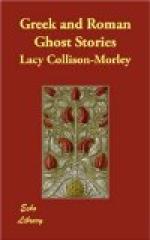That small household matters may weigh heavily upon a woman’s conscience, even nowadays, is shown by the following interesting story, which may well be compared with the foregoing.[81] In July, 1838, a Catholic priest, who had gone to Perth to take charge of a mission, was called upon by a Presbyterian woman. For many weeks past, she explained, she had been anxious to see a priest. A woman, lately dead, whom she knew very slightly, had appeared to her during the night for several nights, urging her to go to a priest and ask him to pay three shillings and tenpence to a person not specified.
The priest made inquiries, and learnt that the deceased had acted as washerwoman and followed the regiment. At last, after careful search, he found a grocer with whom she had dealt, and, on being asked whether a female of the name owed him anything, the grocer turned up his books and informed him that she owed him three shillings and tenpence. He paid the sum. Subsequently the Presbyterian woman came to him, saying that she was no more troubled.
The spirits of the worst of the Roman Emperors were, as we should expect, especially restless. Pliny[82] tells us how Fannius, who was engaged upon a Life of Nero, was warned by him of his approaching death. He was lying on his couch at dead of night with a writing-desk in front of him, when Nero came and sat down by his side, took up the first book he had written on his evil deeds, and read it through to the end; and so on with the second and the third. Then he vanished. Fannius was terrified, for he thought the vision implied that he would never get beyond the third book of his work, and this actually proved to be the case.
Nero, in fact, had a romantic charm about him, in spite of, or perhaps because of, the wild recklessness of his life; and he possessed the redeeming feature of artistic taste. Like Francis I. of France, or our own Charles II., he was irresistible with the ladies, and must have been the darling of all the housemaids of Rome. People long refused to believe in his death, and for many years it was confidently affirmed that he would appear again. His ghost was long believed to walk in Rome, and the church of Santa Maria del Popolo is said to have been built as late as 1099 by Pope Paschalis II. on the site of the tombs of the Domitii, where Nero was buried, near the modern Porta del Popolo, where the Via Flaminia entered the city, in order to lay his restless shade.
Caligula also appeared shortly after his death, and frequently disturbed the keepers of the Lamian Gardens, for his body had been hastily buried there without due ceremony. Not till his sisters, who really loved him, in spite of his many faults, had returned from exile were the funeral rites properly performed, after which his ghost gave no more trouble.[83]
On the night of the day of Galba’s murder, the Emperor Otho was heard groaning in his room by his attendants. They rushed in, and found him lying in front of his bed, endeavouring to propitiate Galba’s ghost, by whom he declared that he saw himself being driven out and expelled.[84] Otho was a strange mixture of superstition and scepticism, for when he started on his last fatal expedition he treated the unfavourable omens with contempt. By this time, however, he may have become desperate.




